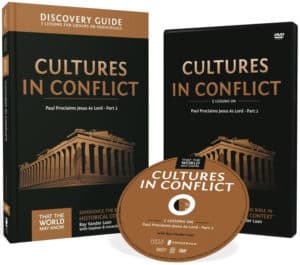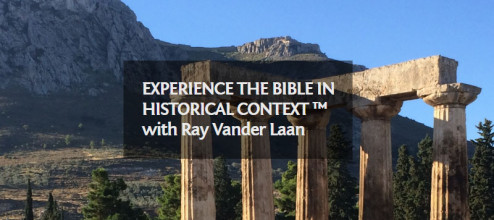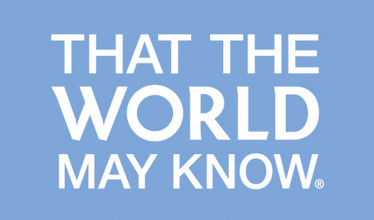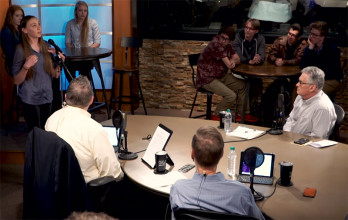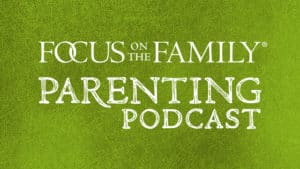Opening:
Excerpt:
Ray Vander Laan: So, God’s people were called to live. Every single thing they did, like you guys, when you’re in school, when you have friends, when you have a job, when you interact on the soccer field, every single thing you do in God’s mind is a way to say to the world, watch what it looks like when you play soccer as someone who is serving God in everything I do.
End of Excerpt
John Fuller: Ray Vander Laan has been teaching principles from the Bible for over 40 years now, bringing the Scriptures to life in some amazing ways. And today on Focus on the Family, he’ll inspire you to serve Jesus Christ and run the race with a passion and a zeal that maybe you haven’t experienced for a while, or ever. Stay tuned. Your host is Focus president and author Jim Daly, and I’m John Fuller.
Jim Daly: And John, there is so much inspiration that we can find in reading the Scriptures every day. The Bible keeps us growing and learning, and it helps us to be more Christlike in a culture that’s getting further away from God, seemingly. I think God has His plan, and he’s working it. Never doubt that. But part of the hope of the world is in the hands of our young people today, and we need to continue pouring into their lives and help them to be witnesses for Christ. So, we’ve invited a number of high school seniors from a local Christian school here in Colorado Springs to join us today in the studio with Ray. And we’re going to have some interaction with them a bit later. Ray Vander Laan, as many of you know, is a longtime instructor of religion at Holland Christian School in Holland, Michigan. He’s a Bible teacher on our DVD series That the World May Know, which is celebrating 25 years, right? That’s amazing. Congratulations, by the way.
Ray: Thank you.
Jim: (Laughter) And let me say welcome to Focus on the Family.
Ray: Thank you. It feels like home.
Body:
Jim: You know Ray, Jean and I had the privilege a couple of years ago to visit the Holy Land with you, Ray, and the Scriptures just come alive there. And it made me realize there’s so much more we need to understand about the Jewish culture in Scripture…what their world was like, and how they thought about Abraham, or Moses. It’s a different perspective than we have in Western culture.
I want to begin today by looking at the life of David. Everybody, rightly, loves the David, and the story of David and Goliath. His courage as young boy. Set the story up for us, with the Jewish context.
Ray: OK, maybe I could give a little bit of context of why that story matters so much in my own experience in life. When we started this project of That the World May Know, that was a phrase I found in David’s confrontation with Goliath. He said, “I’m going to throw this stone that the world may know there is a God in Israel.” And I thought that idea captures the essence of the biblical story. We read our Bibles, and it’s obvious that God created a beautiful world, sin came and messed it up… and God worked through this whole process to send his Son to send his Son to fix that brokenness and restore our relationship to God. And so, we sort of end there sometimes, at least I do. But God’s purpose was not only to save folks because He loved them. God’s purpose was to save folks, so they could become His living picture of what it looks like if God is in charge of your life. So God’s people were called to live. Every single thing they did, like you guys, when you’re in school, when you have friends, when you have a job, when you interact on the soccer field, every single thing you do in God’s mind is a way to say to the world, watch what it looks like when you play soccer as someone who is serving God in everything I do.
So that motive of living – because I’m saved – that the world may know there is a God in heaven – is the heart of what, in my opinion, a Jewish person would say the godly life is like. And I found that in David – somehow at his young age – and that’s the second reason I love that story so much, because the way the text seems to describe him, David is probably younger than you guys. I doubt he was a high school senior. He’s probably a high school freshman, maybe a sixth grader. But somehow this kid, the youngest in his family – not important in that cultural family setting – somehow this kid had caught the vision that he was supposed to live that the world may know. And that just overpowered me. How in the world can this kid know that at that age, when I rarely think about it at whatever age I was at a particular point?
So that became the heart of it. In fact, I remember way back, 25 years ago right now, when we were beginning to talk about what should we title this project we’re involved in, and I wanted that title, because I thought it really captured the essence of why God saves people. And I remember not that people didn’t like it, but a little bit of resistance, because it doesn’t abbreviate well. It doesn’t make a nice acronym. It takes a lot of room on your packaging. But I wanted that word – That the World May Know. Now there’s a second thing, if I may, that I’d love to share about why that David story is so powerful. He’s the youngest, so what he’s going to inherit when…when his father passes away, you could put in your backpack. His older brother’s gonna get everything. That’s how it was done in that culture. So, David is relegated to being out in the desert wilderness with the sheep. Now maybe you saw that in Israel. Shepherds – usually boys or girls that haven’t married yet, sometimes older women, but usually boys or girls – when they are out with the sheep, they throw stones almost constantly, just constantly. Once in a while you’ll see a slingshot, nowadays. Often, it’s just throwing stones. But the kids will sit there and throw stones. They don’t throw them at the sheep. I’ve seen them throw them to the right to move the flock to the right, or to the left to move the flock to the left.
So when David came to see his brothers when Israel and the Philistines were face-to-face and bring food to them at his father’s instruction, he saw that giant and heard his defiant challenge to the God of Israel. And he immediately said, “Why doesn’t somebody do something about this?” typical middle school kid. “Why don’t we fix this? Why isn’t somebody doing something?” So he’s brought to Saul. And Saul wants to give him armor, weapons, shield. And David says, “I don’t know anything about them. I don’t want to have that.” So he takes his stick, goes down to the brook and he picked up five stones. He’s a shepherd. And it struck me years ago that David simply did what he had become good at doing, what he was talented to do and what he had been trained to do.
So I challenge my students constantly, throw your stone. God has gifted you in something. God has given you a love for something. God has opened doors for you – college next year, military next year, a job next year. When you begin to find what your stone looks like, throw it. Don’t let anyone talk you out of it. If you try and throw a stone that isn’t your stone, it isn’t going to work. You throw the stone that God has entrusted to you in that situation. And then you do it, not so the world may know about you. You do it that the world may know what God is like. And I think that’s a great way of thinking about our role to live that the world may know.
Jim: Ray let’s move to the story of Daniel. That’s another great young person’s story. I mean, we’ve covered David. And there’s so much we didn’t cover with David. But you gave us – you whetted the appetite about what David was doing and what he was facing. What about Daniel? That’s how many – how many years before David is the story of Daniel?
Ray: Probably about 500 would be a safe number to throw out. There’s various dating schemes, if you will, in terms of exactly, but about 500 years later. That’s an interesting story to me for some of the same reasons. The word used to describe Daniel’s friends means a pre-adolescent, or an adolescent. So, again, we got middle school kids. We make Daniel’s friends college age, or maybe early career at 28. These are guys as young as the students sitting in here today, maybe younger than that. These are just kids. And there’s an interesting commentary at the beginning, which Westerners don’t pick up on. We believe it. But we don’t pick on it. Do you remember their names? They got these strange names.
Jim: Meshach, Shadrach…
Ray: Shadrach, Meshach and Abednego. Now, if you look at the meaning of those words, those names, they’re awful. Shadrach means, “who is great like the god Aku?” Now who would name their kid Shadrach unless you loved Aku? Meshach means, “I will do whatever Aku commands me to do.” Now, Aku is the most disgusting, perverted God you could ever find in pagan culture. And he says his name means, “I’ll do whatever he wants.” Abednego means I am the slave of the god Nabu. Nabu isn’t quite as bad a God, but Nabu’s not a very nice God, either. Now, who would name their kids that? Well, that was not their parents name for them. We don’t pick up on that in the first chapter they are given Jewish names. Their Jewish names are Azariah, Mishael and Hananiah. And one means “The Lord is powerful.” One means “I will do what the Lord tells me to.” And the last one, Hananiah, “The Lord will rescue me.”
So the story is going to tell us which name will these young kids live up to, because it’s the king of Babylon who gives them their pagan name. Why? Because, he wants to change who they are. Your name there wasn’t just a nice word, like Phoebe, and that’s a name, because I like that name from the Bible. A name was a description of who you wanted to be. So, if the king gave you a disgusting pagan name, what he’s trying to do is to get you to turn – to become pagan in your life. So the question is, are they going to live up to their pagan names? Are they going to live up to their parents’ godly names?
Honestly, I look at these students sitting here in this room this morning, and if you were in my class – and so it isn’t fair to do to you, because you didn’t even know me – but if you were sitting in my class, I’d say you guys all have two names. You have the name that describes how God thinks of you. He knows your talents. He knows your heart. He has a name for you, who He wants you to be in life, the stone He wants you to throw, the faith He wants you to live. God has a name for you. And I don’t mean that literally, like it’s on a piece of paper. I mean He has a description of you, but so does your world. You have a reputation. Other people think of you in a certain way. They describe you in a certain way, in their own mind. Maybe you deserve it, maybe you don’t. My question is, which name will you live by? Are you gonna live by the name of how God – who God wants you to become? Or are you going to live up to some other identity?
And the evil one in our world – it’s not a pagan king this time – would delight if you decide to abandon your God name and live up to some other title. It’s the same dilemma these kids had. And these kids – my Jewish friends are horrified that we call them Shadrach, Meshach and Abednego, because it’s like the whole stories – they were willing to burn to death not to be those names. How in the world can we possibly call them that? But that’s a powerful moment. Now, in that the king demands that they live up to their pagan names. And he says, “You will worship me.” And they say, “No, we are going to be Hananiah, Azariah and Mishael.” And they don’t say it in those words. But that’s what it means, we’re gonna live up to our God names. He said, “Then, I’m gonna burn you to death.” And they said, “OK, go ahead. We would rather burn than be somebody other than who God has called us to be.”
So he throws them into this fiery pit. There’s some archaeological evidence that suggests that actually was a punishment used, even evidence of places where that may have happened, like Roman’s used crucifixion, they used this kind of immolation in natural gas fires that came up out of the ground in the land of Babylon. God saved them, if you remember. King put them in that fiery pit. They looked in, and there were four, not three, because there was an angel there protecting them. But then the cool part of the story – raises the hair on the back of my neck, because it brings us back to exactly where we started – the next morning, they were still alive. So, the king fished them out. And then he said, “Praise be to the God of Israel who would protect these young men.”
All of a sudden we discover, ahh, they were willing to burn, not just because they were brave, or because they wanted God to be happy. They did. They were willing to burn, because they wanted the world to know about Him. And the end product of the story isn’t just God saves people in trouble. The end product of the story is if you serve Him faithfully, He will be glorified. And that’s that whole thing about God wanting to redeem a partner that the world may know. So, Daniel’s three friends are a classic example where the words aren’t actually used, but whose brave action ends up with the world knowing about the God of Israel and a pagan king, no less, praising the God of Israel.
Jim: Ray, when you apply it in that way, especially for young people, and I know they’re thinking of questions right now, how do you apply it to today’s culture? I mean, it’s pretty self-evident. But, you know, the regular high school young person that you’re teaching at Holland Christian School, or the students around us right now. How do they grasp applying what happened to Daniel or David and put it to their own life, because it’s modern now? It’s not like then. And of course those are…
John: Not so dramatic.
Jim: …Those are Bible figures. Those are…
Ray: And they’re saints, you know, they’re, you know, we tend to think of them as much more religious and faithful…
Jim: …Right, not regular human beings.
So how do you encourage students to do that? I mean, I like the idea of knowing the stone God has given you to throw and throw it. Don’t let anybody talk you out of it. But also, how am I going to be like that Daniel? How am I going to be like that David in my culture today?
Ray: …I think my approach – and I don’t have an answer, because I don’t think it’s simple. I think it’s different in every person’s life about how you learn certain God lessons. But there are two things that I try to do. One is what we’ve been doing here, which is to look at biblical stories and catch a glimpse and a vision of what God is up to with David throwing a stone and say, “What does that have to do with me?” Now, it’s a less of a leap to say, “OK, what is my stone?” I talked to a few of you guys before and heard a little bit about college majors and things you might be interested in. And I got just a glimpse of maybe what your stone is. I don’t know if you know that for sure. And God may change your mind ten times before you actually get to the point where you’re throwing that stone. He did with me. But once you find it, that metaphor works.
So it seems to me, Jim, that the answer to your question is this group sitting in here this morning are the people God has raised up to head out into life and throw your stone – that the world may know – by watching God’s image – at least a glimpse of what God is like. And that’s what changes human history.
Jim: Hm.
Ray: It isn’t usually changed by what people say. We want to tell people about Jesus. Well, that’s a great thing. Tell them. I think God is focused sometimes just as much on – let’s show them what He’s like. So, my – my approach is to say to students, “What would God want to look like in this situation?” If we learn to think of that already – two, three, four – that’s why I love Focus on the Family, because parenting is about helping children not only know what’s right and wrong, but helping children begin to practice being what God is like.
Jim: Yeah.
Ray: So, I wish I could go back and re-parent my daughter sitting out here.
Jim: (Laughter) Don’t we all?
Ray: Yeah (laughter), because what I would have stressed much more is to say, “What would God want to look like in this situation where your brother is picking on you? What would God want to look like?”
Jim: Yeah.
Ray: And it isn’t that that’s going to change my daughter, as much as now it gets a mindset that always asks that question no matter what I’m going to do.
Jim: Hm.
Ray: And if you guys can catch that vision already at your age – I would give so much to go back and catch that vision when I was 18. It’s not that I was bad. It’s just I hadn’t – I was so much more focused on me and not on the fact that God had called me to be living that the world may know. At the end of life, for whom will you have thrown your stone? If you throw it that the world may know how great you are, that you can be famous, that you can be important – if that’s your ultimate reason, someday your grand kids will pick up the broken pieces of your dreams and sell them at a garage sale. It isn’t gonna matter.
Jim: Hm.
Ray: Isn’t gonna last. But if you throw your stone that the world may know, whatever that stone is, we’ll sit in heaven and discuss it someday, because it’s eternal, by the grace of God.
John: Well, this is Focus on the Family. And today our guest is Ray Vander Laan, a great Bible teacher and the host of the Focus on the Family series, That the World May Know, 25 years now of partnering with Ray in teaching the Scriptures and helping us better understand life applications of the Scripture. And you can find out a whole lot about That the World May Know at our website, focusonthefamily.com/broadcast, or give us a call. Our number is 800, the letter A and the word FAMILY.
Jim: Let’s move to questions. Let’s get a couple of questions in here.
Sam: Hi. I’m Sam. So Ray, one of the things we talked about a lot in our Bible class was finding God’s will. What are some things that you recommend to find the stones that you were talking about, or find God’s will?
Ray: Great question. In a way, you guys have me at a bit of a disadvantage. When I’m in school and someone asks a question I don’t know the answer to, I just say, “It’s not on the test.” And they say, “Oh. Never mind, then. I’m not interested.”
Jim: (Laughter).
Ray: So since there’s no test, I have to address the question. Brilliant question, really. Sam, that – that is a great question. How do you discover what your stone looks like? I don’t have a simple answer to that. I know that’s a difficult journey, and you’re at one of the toughest places in that journey in life right now, because you have to be thinking about that before the opportunities necessarily come along. You have to be thinking about college, or finding that first job, or going into the military for a period of time. But with students, I make several observations. One is this – It seems to me that God’s leading involves several elements. One, it involves a close relationship with Him, scripturally, biblically. And so, I advise students already – long before they’re your age – to make sure that you have regular interaction with God biblically, because often, that Word of God – which now becomes stored up in our heart – is used at a given moment to nudge us. And David didn’t discover, “I’ve got to throw this that the world may know,” 10 minutes before he faced Goliath. He had to have been thinking about that years earlier. And where would that idea have come from? So, that’s first.
Second, I think God puts us in a community for a reason. I think others’ observations about what your stones are really important. They’re not the final word. They’re not the decision-maker. But they matter, because sometimes, we may know – we may not realize we have a particular stone, a particular interest, a particular love, until others observe it in us, or notice how good we are with that particular skill or thing. The third thing I say to students is this. It seems to me that ultimately, as difficult as your stone may turn out to be at a given moment, it will often – if not almost always – be something you really find you love…
Jim: Hm.
Ray: …and are absolutely contented with. One of the struggles I find with people your age is they love something, but they’re being told there are no jobs, or it doesn’t pay enough. And so, they find – “Well, I can’t do what I really love, because I wouldn’t be able to make a living.” I think you gotta let God worry about that. God’s economy is never down. If you’ve got something that you love and have skill in, and an opportunity comes along, I think that’s God’s way of saying, “Give us a look. Take a shot. Look at it. Take a shot. Consider this.” Because your stone will always be in connection with where God has brought you in life. David’s stone was, because he was a shepherd boy. If he would have been an olive farmer, I don’t know what he would have done to Goliath, because he wouldn’t have had the skill with the slingshot. So that’s another element.
So throw your stone. Try and figure out what it is. But you may discover, over time, God is going to nudge you and say, “Well, let’s adjust that a little, or a lot.” I went to college initially to be a lawyer, and I don’t know if I’d have been any good at a lawyer. But He found little ways to say, “Some of those skills – the philosophy you studied – are important, but I’m going to nudge you.” So, that doesn’t answer your question, but maybe some things to think about.
Jim: Yeah.
Ray: Thanks, Sam.
Jim: That’s good.
Ray: Hm.
Jim: You know, if you’re in God’s will, you’re – if you’re in God’s will, it’s in this sphere.
Ray: Hm.
Jim: And he just wants you waking up every day, you know, going to work for him, regardless of what you do. Is that a fair kind of assessment of that?
Ray: In my opinion, absolutely.
Jim: Rather than stressing to say, “I gotta be on this specific point.”
Ray: Exactly. So for me, he’s – my stone is teaching.
Jim: Right.
Ray: But I think God has let me use my experience, my situation, His provision to decide how and where I’m going to do the teaching.
Jim: Hm.
Ray: And that has really comforted me. I say to students – going back to Sam’s question. Don’t want to over-answer this, but if you can wake up in the morning and, like David, say, “You know what? This is really my stone,” most mornings, you’re going to find life is good. And it won’t matter whether they pay you six figures or just enough to get by. But if you wake up in the morning and say, “What I gotta do today absolute” – I don’t know what word to use that would be nice on air…
Jim: (Laughter).
Ray: “…that this is lousy.” I don’t care how much they pay you. Life is miserable, absolutely miserable.
Jim: Think of that. All right. Next question.
Zach: Hi. So, my name’s Zach, and you mention a lot about how it really matters the way we act so that the world may know. My question is – so I work in the fast-food industry. And many times, it is hard to act in a good way like that. What’s some suggestions to…
Ray: Great question.
Jim: People are irritated?
Zach: Yeah (laughter).
Jim: “Give me my food!” (Laughter).
Ray: Now, that’s – that’s a question that you expect from people your age, because for you, it’s not just a theory. You – you realize how hard it is to be what this theory is asking you to be. This is not simple. When you go to a Christian school like you guys do, it’s not always easy to be like Jesus, but it’s easier than it is at a fast food place, in some cases. A number of things there – if you look at the Biblical characters who were effective in doing this, there are two things that stand out to me. One, they were men or women of relationship with God. And I think it takes this constant connection to Jesus to say, “OK, Jesus. I’m going to work today. Yesterday, I wasn’t much like you with those two customers. Today, I’d like to be a little more like you. Talk to me. Help me.” That’s obvious. A second is this: I would encourage you to develop a community that can hold you accountable and be in prayer for you. So, if you go to work tomorrow, and you know there’s two of your friends who are going to pray for you a couple of times while you’re at work that you will be Jesus-like, and when you get off of work, are going to say, “Hey. Was it better tonight? How are you doing tonight?” And I don’t know how your friends with – they probably text it, not say it on the phone.
I think there’s – there’s an interesting comparison that comes to mind – the two characters that I came across in Judaism of the opposite. One is David, who did it that the world may know. One is Samson, who did it to get revenge for himself. Now, Samson, in his story, ends up all alone in a cave. So, from a Jewish point of view, you know Samson isn’t going to be effective at the end. He may have accomplished some great things, but he’s not going to be the great hero, ultimately, because he’s alone. David ends up alone in a cave. And if you read the psalm he wrote when he was there, his prayer is, “God, send people to join me, so that together, we can praise your name.” David wants community, and God sent him 400 other young men to become part of a movement. And I think sometimes, we think somehow this – that the world may know – I have to go alone.
Parents say to me, “My son or daughter is going to” – and then they’ll say something like Purdue, or University of Michigan, or some secular university. “Do you think they can handle it?” My answer is always this. “Are they going alone?” If they go alone, I’m not so sure that I could handle it. But, if they say to me, “Well, they’re going alone, but they’re going to try and find a good Christian community on campus – a Bible study group, a group of Christian friends, a church nearby,” I say, “Of course they can handle it.” So, that would be a second thought that I have. Thank you for taking it seriously enough to think about that. That’s awesome.
Jim: This has been great, and I want to say thank you for being here. And to all the young people around, thank you for being here as well, for your great questions. And, there is so much content here. You’re not going to hear it all at this moment. But, go to the website. Get the CD. We’ll do whatever we need to do to get that in your hands. It is a fascinating discussion. I’m so grateful to you, Ray, for being here. Thank you so much.
Ray: Thank you. I’m honored to be part of the Focus family.
Closing:
John: And you can see that additional time with the students on our website…and then we’d like to offer you the latest DVD set in the series That World May Know. It’s is called, Cultures in Conflict, it’s set 16 and it was filmed, of course, in the Middle East, it fits right in with today’s conversation. And it really has some awesome application for you as you engage with today’s culture.
For a gift of any amount to Focus, wither monthly pledge or one-time donation we’ll send you a copy of that DVD set to you. So please, ask for it when you call. Our number is 800-the letter A and the word FAMILY, or stop by focusonthefamily.com/broadcast. Next time you’ll hear from Dr. Greg Smalley as he explains why it’s essential to have a conversation with your future son-in-law.
Teaser:
Greg Smalley: Because this is a big deal. Next to our relationship with God, this is one of the most important decisions in the journey that they would then embark on. Marriage is such an amazing journey. So I was very excited for them but also feeling very, very protective. This is my firstborn daughter.
End of Teaser










